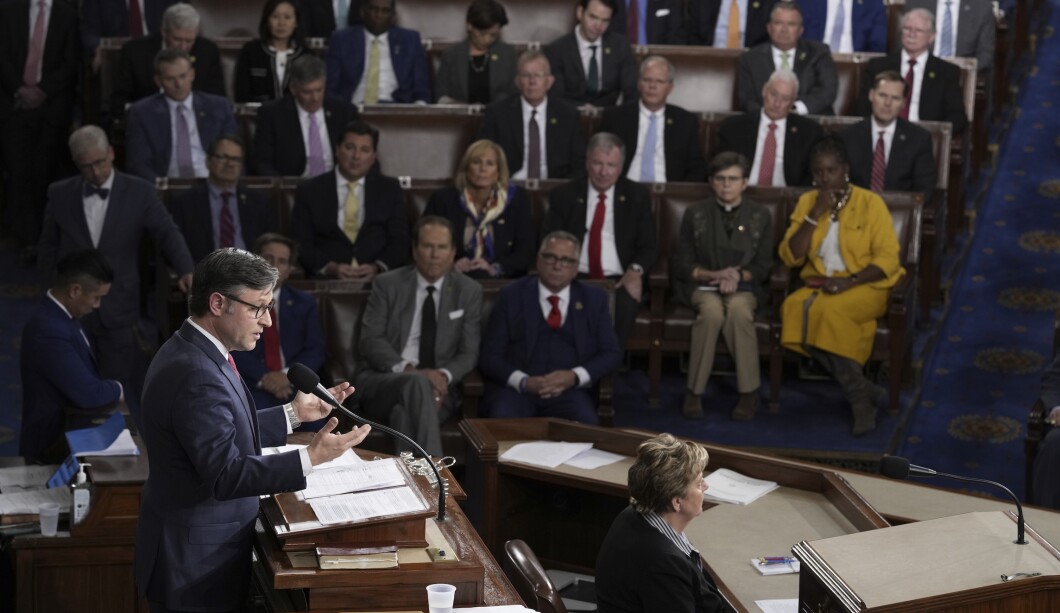
An intra-Republican struggle to choose a successor to ousted House Speaker Kevin McCarthy (R-CA) has reached a conclusion that Rep. Matt Gaetz (R-FL) claims as an unalloyed victory.
“We have a speaker [who is] more honest and more conservative,” Gaetz, the Florida Republican who orchestrated McCarthy’s removal, told reporters. “I think these are the most productive 22 days we’ve had in the House of Representatives because we were able to vanquish the lobbyist vessel formerly known as Speaker McCarthy.”
HOUSE ELECTS MIKE JOHNSON AS SPEAKER AFTER THREE WEEKS AT AN IMPASSE
McCarthy has been replaced by the chairman of the Republican Study Committee, a fourth-term Louisiana Republican who succeeded where three previous nominees had failed because “no one hates him enough to stop him,” as one senior House Republican aide put it. And that grueling process has Gaetz, an arch-opponent of U.S. aid to Ukraine, aiming for another victory.
“A majority of Republicans are against sending more money to Ukraine in the House of Representatives,” Gaetz said, referring to the 117 Republicans who voted against a bill to provide $300 million worth of assistance. “And we have something called the Hastert Rule that would prohibit any speaker from bringing legislation to the floor that doesn’t have the support of the majority of the majority.”

That legislation garnered 311 votes in the House, nonetheless. And another amendment to prohibit all aid to Ukraine, offered by Gaetz the same week, drew even less House Republican support when it failed on a 339-93 vote. One of those votes in favor of Gaetz’s ban came from Johnson, however.
“I think there’s a clear majority, in the House of Representatives, who are in favor of protecting our interests in Ukraine and meeting our treaty obligations [and] devastating Russian military might,” Sen. Roger Wicker (R-MS), the top Republican on the Armed Services Committee, which oversees the Pentagon and U.S. military activities, told the Washington Examiner.
Johnson has a mixed record on military aid for Ukraine. Less than two months after Russian President Vladimir Putin launched his full-scale invasion, Johnson voted for a “lend-lease” program to arm Ukraine, a law named for President Franklin Delano Roosevelt’s plan to make the United States the “arsenal of democracy” against Nazi Germany. He voted against an aid bill for Ukraine the following month.
“We should not be sending another $40 billion abroad when our own border is in chaos, American mothers are struggling to find baby formula, gas prices are at record highs, and American families are struggling to make ends meet without sufficient oversight over where the money will go,” Johnson said at the time.
The extent to which Johnson intends to “impose his policy preferences on the conference,” as the senior Republican aide put it, isn’t clear yet.
“That remains to be seen,” Wicker said. “The speaker is, obviously, a very powerful position.”
Republican proponents of aid for Ukraine are holding out hope that he will approach those issues differently now that he has responsibility for the outcomes.
“It’s a different role than being a member, even conference chair,” said Sen. Marco Rubio (R-FL), who sits on the Senate Intelligence Committee and the Foreign Relations Committee. “I would imagine if he’s been against it in the past, it’s probably not a good sign, but he will also have more influence over what the aid looks like.”
Last week, President Joe Biden requested $100 billion of supplemental funding for various military priorities, including $60 billion worth of aid for Ukraine and another $14 billion to assist Israel in the wake of the terrorist attacks that ignited a war against Hamas. Biden’s team, in an implicit response to Ukraine aid skeptics, emphasized that much of the money would be spent in the United States.
“This supplemental request invests over $50 billion in the American defense industrial base, ensuring our military continues to be the most ready, capable and best-equipped fighting force the world has ever seen,” White House Office of Management and Budget Director Shalanda Young wrote in a letter to the House. “The funding will expand production lines, strengthen the American economy, keep us safe and create new American jobs.”
A funding bill that combines those issues might pass more comfortably by giving lawmakers a justification for backing the overall legislation even if a particular provision is unpopular. Gaetz hopes to break the supplemental legislation into “single-subject bills.”
“I view the Israel conflict and the Ukraine conflict as very distinct,” he said. “And I think that they both deserve their own dignity and their own consideration.”
CLICK HERE TO READ MORE FROM THE WASHINGTON EXAMINER
Wicker struck a “relatively” optimistic note. “I am relatively certain that when it’s all said and done, there will be a supplemental that contains support for Israel, the Indo-Pacific, border, and Ukraine,” he said.
Gaetz, too, was optimistic. “I expect [Ukraine] to be less of a priority than Israel because in Speaker Johnson’s remarks both last night and today, he mentioned Israel and not Ukraine,” he said.





